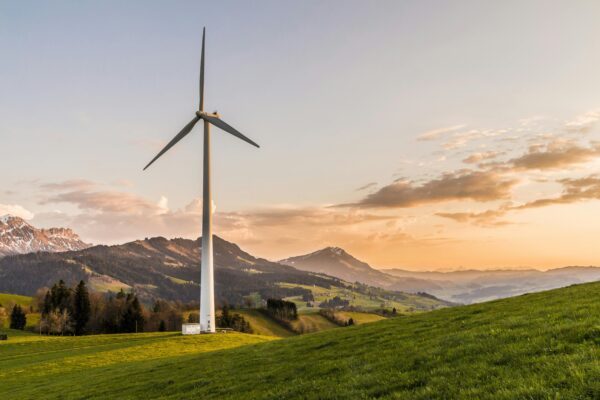Dieser Text ist im Rahmen des Reatch Ideenwettbewerbs 2023 entstanden. 2023 war ein besonderes Jahr für die Schweiz: Wir feierten 175 Jahre Bundesverfassung und damit 175 Jahre Schweizer Bundesstaat. Das nahmen wir zum Anlass, um nach Ideen für die Zukunft der Schweiz zu suchen. Welche Weichen müssen wir heute stellen, damit im Jahr 2198 die Menschen mit dem gleichen Stolz auf 2023 zurückblicken, wie wir heute auf die Entwicklungen seit 1848? Eine Auswahl der eingereichten Ideen wird auf www.reatch.ch veröffentlicht.
Switzerland is currently passing a crossroads in its electricity production and is heading towards a growing dependency on foreign electricity imports in order to meet its demand. We argue that Switzerland needs to abolish this path of hardly controllable dependency and establish a largely independent electricity supply. To achieve this, Switzerland desperately needs a bold and ambitious plan to expand its renewable electricity production. We suggest Switzerland to massively shorten the approval process for renewable energy projects. Furthermore, the widespread “not in my backyard” mentality has to be tackled by political counteractions. Collaboration between start-ups and established corporations should lay the foundation to bring scientific novelties quicker to market, making technology more efficient. We hypothesize that a resilient and zero-carbon emission electricity mix will boost the local economy.
Introduction
Switzerland, a country generally known for its political stability and its pragmatic problem solving is currently facing an enormous challenge within its energy sector that has already far-reaching negative effects on its economy and, if not addressed properly, may result in possible blackouts. Switzerland is currently unable to cover its electricity needs and is therefore very dependent on electricity imports from neighbouring countries such as France and Germany in winter.[1] However, due to the disagreements between Switzerland and the EU about the so-called “Institutional Agreement”, EU members are no longer obligated to supply Switzerland with electricity. With the Russian aggression in Ukraine starting on the 24th of February 2022, the whole theme of energy supply gained huge attention in the media, as gas and oil prices skyrocketed all around the world. Last year the Swiss parliament launched its solar express, a symbolic act rather than a long-term solution, as the output of the planned alpine solar projects is but a drop in the ocean. In short, Switzerland has currently no tangible strategy on how to address this serious issue. This is exactly where this essay should come into place, outlining a possible future for a resilient Swiss energy grid that is prepared to take a key role in Switzerland’s net-zero goal in 2050. We will evaluate the current situation, discuss the potential of renewable energy and how to overcome possible drawbacks related to the expansion of the renewable energy sector.
The growing dilemma of our energy supply
To grasp an understanding of the fundamental misalignment of the electricity grid we need to study the data of the year 2022 first. In this year, Switzerland consumed a total of 765,000 Terajoule (TJ) of Energy, of which 453,000 TJ (59.2%) were produced by fossil fuels (oil, gas, and coal) and 205,000 TJ (26.8%) were electricity.[1] The majority (approx. 60%) of the energy consumed therefore still came from fossil fuels. Exactly this part should shrink rapidly in the coming years, while the electricity sector must fill this gap. However, 37% of the Swiss energy is produced by our three nuclear power plants, which will most likely have to be taken off-grid until 2045 due to safety concerns.[1] The construction of new nuclear power plants was banned by the Swiss voting population back in 2011. Furthermore, the Swiss Energy Foundation (SES) concluded that the costs for a new nuclear power plant would exceed 10 billion CHF with a construction time of over 20 years, making it an unviable investment. Thus, the phasing out of nuclear power rips a huge hole in Swiss electricity production, especially in winter, where we already largely depend on imports from dirty German lignite power plants or French nuclear energy. To conclude, Switzerland desperately needs to fill the rapidly growing gap in electricity production, while an expansion of nuclear energy is not an option, and the potential of hydroelectric reservoirs is already largely exploited. This leaves Switzerland with only two options: First, we could import more electricity from neighboring countries, or second, we streamline all our efforts to rapidly increase the renewable energy sector (wood, solar, wind, biofuels) which currently only accounts for 14% of the total energy consumption.[1] We are convinced that only the second option is a viable long-term solution, for reasons we will discuss in the following paragraphs.
From long approval times to poor acceptance among the Swiss
In the upcoming energy transition towards a net-zero goal, politics will play a key role. The political responsibility can be divided into two majors. First, the legal basis for renewable energy projects must be completely reconsidered. As each project needs sequential approval by municipal cantonal and federal authorities its realization takes more than 20 years, deterring potential investors. This issue must be resolved; approval times need to be massively cut, to make energy projects more attractive for potential investors. Second, the political system should foster an innovative environment where research in the field of renewable energy and energy storage is financially supported. In our current system, this expensive fundamental research struggles to find appropriate funding. The still low price of fossil energy makes investments in new technology unattractive. Linked to political aspects is the acceptance by society. The fundamental problem is illustrated by the typical Swiss NIMBY (not in my backyard) mentality, slowing down the approval of energy projects such as wind farms. Here, a possible solution would be a close collaboration of companies with local communities. Pilot projects in Germany demonstrated that specifically, financial participation (e.g., a reduction in electricity costs for neighbouring residents) in wind projects helped raise approval rates and awareness in the local community surrounding the wind farm. In addition, national interests should be ranked higher than the interests of a minority affected by a potential project. (As it is already the case with road infrastructure, e.g., national highways) To sum up, our government should dedicate substantial resources to the development of a serious and feasible long-term energy strategy.
Overcoming the biggest drawback of renewables
Renewables are inconsistent in terms of stability and output in production due to weather factors. To counteract peaks of massive overproduction and times of energy leakage, efficient storage needs to be found. In the near future, storage batteries will play a crucial role to balance the grid. A promising new approach in this field is molten-salt batteries, a technology being developed by several Swiss start-ups.[2] In the long run, we suppose that power-to-gas will play a substantial role, as it enables simple storage of fuel which can be used in various applications such as ships, airplanes, or trucks. The best energy is the one never used. Transport and storage of energy are required to be as efficient as possible, a topic that must be addressed by science. However not only is science obligated to increase efficiency but also to develop sophisticated ways of producing, saving, and converting energy. An example of this, is wind energy. By increasing altitude wind, velocity rises and variability sinks, a characteristic that can be exploited. An approach could be the so-called “air-born wind energy,” in short “flying wind turbines” tethered to a ground station. This invention requires fewer resources and does not affect the landscape as much as traditional wind turbines. A Swiss start-up that is currently working on this approach is TwinTec.[3] The future will tell if this technology is a scalable solution, however, the concept is promising. Furthermore, one has to focus on saving energy in the construction sector, as it accounts for more than 40% of energy consumption.[4] In Switzerland, buildings are on average 45 years old and have a lifespan beyond 100 years.[5] More than half of these buildings are poorly insulated and waste too much heating energy. Additionally, around 60% of all buildings are heated with oil or gas. By tackling both problems through better insulation and heat pumps/geothermal energy, Switzerland can reduce a substantial share of its carbon emissions. Science plays a key role in developing new heating solutions that can be easily integrated into already existing buildings, as this is a major obstacle in current refurbishments.
Strong collaboration between start-ups and established companies
Innovation and efficiency aren’t limited to science, they should also be an integral part of a net-zero economy. Currently a problem is the lacking collaboration between start-ups and established corporations. On one hand well established corporations are facing the problem of being not fast enough in innovation and thus can’t offer the most efficient technological solution. On the other hand clever heads often make the innovation happen but struggle in the market launch and commercialisation, due to market inexperience and noncompetitive production costs. Strong partnerships between innovative start-ups or spin-offs and experienced corporations could help to bring innovative scientific discoveries faster to production readiness as well as reducing costs through scalability. Experienced corporations therefore benefit in offering more efficient technological solutions and start-ups from an easier market launch along with a more marketable production. Energy produced in Switzerland allows for investments that stay within the country, thus strengthening our own economy, creating plenty of well-paid jobs and additional tax revenue. This also diminishes financial losses through currency fluctuations. Furthermore, energy independence and stability are the basis for a resilient and successful economic model that maintains our current prosperity.
Summary
In summary we argue that on the political level bureaucracy and regulations for sustainable energy projects must be reduced. Society should shift towards a broader acceptance of wind farms and solar parks. The responsibility of science is to increase the efficiency of existing infrastructure, the discovery of new methods to produce and store energy, and the education of a broad public about the benefits of their cognitions. A collaboration between start-ups and corporations brings scientific innovation faster to market. Switzerland is currently facing a crossroads. One path leads to ever greater energy dependency, a path on which billions of CHF will continue to flow abroad. This is the path we are heading for right now. The other, more desirable path can only be achieved through personal responsibility and political courage that will create a sustainable Swiss energy grid. By following this second path Switzerland has the chance to lay a rock-solid foundation on which our 175-year-old model of democracy and prosperity can continue to flourish.
References
Bundesamt für Energie, “Schweizerische Elektrizitätsstatistik 2022,” BBL, Verkauf Bundespublikationen, Bern, 2022.
FZSONICK, “FZSONICK - THE SALT BATTERY,” FZSONICK, [Online]. Available: https://www.fzsonick.com/home. [Accessed 14 October 2023].
TwingTec, “TwingTec,” 12 10 2023. [Online]. Available: https://twingtec.ch/.
SFOE, “Swiss Federal Office of Energy,” 29 August 2023. [Online]. Available: https://www.bfe.admin.ch/bfe/e..... [Accessed 10 2023].
“Energie-Umwelt.ch,” [Online]. Available: https://www.energie-umwelt.ch/.... [Accessed 12 10 2023].
Die Beiträge auf dem Reatch-Blog geben die persönliche Meinung der Autor*innen wieder und entsprechen nicht zwingend derjenigen von Reatch oder seiner Mitglieder.




Comments (0)